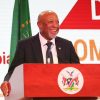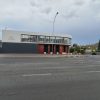Omanyano ovanhu koikundaneki yomalungula kashili paveta, Commisiner Sakaria takunghilile
Veronika Haulenga
Omanyano ovanhu koikundaneki yomalungula kashili paveta, Commisiner Sakaria takunghilile
Veronika Haulenga
Listeners:
Top listeners:
-
play_arrow
Omanyano ovanhu koikundaneki yomalungula kashili paveta, Commisiner Sakaria takunghilile Veronika Haulenga
Economic Community of West African States (ECOWAS) ministers meet for the 5th ordinary session of the ministerial monitoring committee of Integrated Water Resources Management (IWRM) in West Africa
[[{“value”:”
The Ministerial Monitoring Committee for Intergated Water Resources Management (IWRM) in West Africa brings together the ministers in charge of water resources from the 15 ECOWAS Member States for its 5th ordinary session, Friday, 28th June, 2024, in Abuja.
The Ministerial meeting follows the recently concluded 11th Ordinary Session of the Technical Advisory Committee (TAC), which addressed critical issues for promoting Integrated Water Resources Management (IWRM) and sustainable development in West Africa. The meeting covered topics such as the draft Directive on managing shared water resources in the region, the development of hydraulic infrastructures, the promotion of new transboundary basin organizations, the establishment of a West African Water Facility (Fund), and the Regional Initiative for the Development, Resilience, and Valorization of Water Resources (DREVE).
DREVE is an ambitious, innovative program led by ECOWAS and other West African regional integration organizations, notably WAEMU and CILSS, with financial support from the World Bank. Its implementation is expected to significantly enhance sustainable development in the region.
In his opening remarks, Mr. Sediko Douka, ECOWAS Commissioner for Infrastructure, Energy, and Digitalization, reaffirmed ECOWAS’s commitment to sub-regional cooperation, which is rooted in the shared political vision of all member states as expressed in the “Ouagadougou Declaration” of 1998. This declaration has successfully guided efforts in integrated water resources management for nearly three decades.
Mr. Douka drew an analogy between the water and energy sectors regarding access, highlighting it as one of the major challenges. He emphasized the need to expedite the implementation of tangible projects for water and sanitation access. Consequently, a regional program has been established to provide clean water to rural and peri-urban areas. “We are humbling relying on our technical and financial partners to support us in this process,” he said.
Before declaring the meeting open, Engr. Prof. Joseph Terlumun Utsev, Nigeria’s Honorable Minister, Water Resources&Sanitation, emphasized the need for unity among member states to achieve developmental growth and manage the sub-region’s water resources, both surface and underground. “There is a saying that ‘teamwork makes the dream work,’” he added, “and this can also be said about our sub-region.”
Engr. Utsey highlighted the abundance of water resources across the sub-region, noting that if properly harnessed and coordinated, these resources could serve as a cornerstone for developmental growth, positively impacting health, education, tourism, food security, and energy. However, he cautioned that a lack of proper coordination could lead to underdevelopment and conflict among countries, as activities of one country upstream could pose dangers to downstream nations.
“The sub-region has great potential, and by working together, we can tackle our challenges—from climate change, poverty, and unemployment to inequality and more,” he said.
Distributed by APO Group on behalf of Economic Community of West African States (ECOWAS).
“}]]
Similar posts
Windhoek Weather
Most popular

Mbumba signs off new benefits for retired political office bearers

Former FNB employee arrested after defraud pensioner off N$215, 000

Namdia Heist: More questions, lots of confusion

Omuhwahwameki Michael okuunganeka oshikonga shoku patitha oostola dho Rani moshilongo ashihe.

Walvis Bay woman loses over N$777.000 to a fraudster
Copyright 2025 Future Media (Pty) Ltd | Website by Digital Platforms
Tel: +264 83 000 1000 | Email: news@futuremedia.com.na





